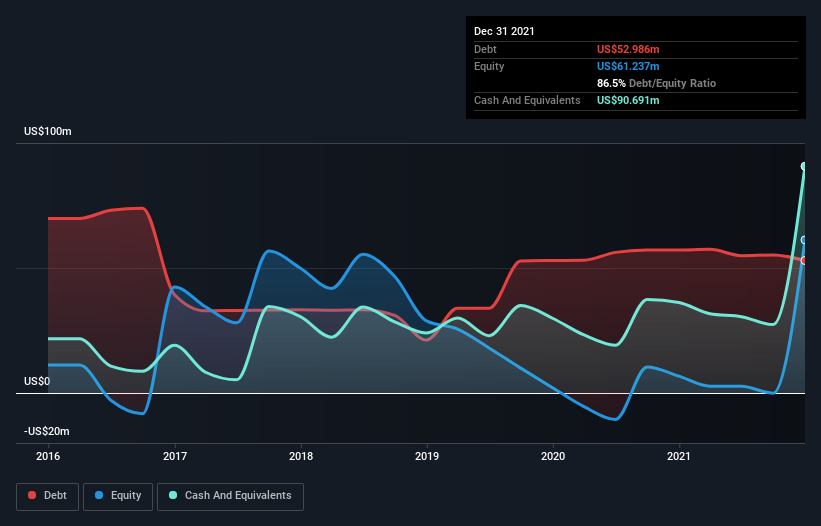Is Apollo Endosurgery (NASDAQ:APEN) Using Too Much Debt?
The external fund manager backed by Berkshire Hathaway's Charlie Munger, Li Lu, makes no bones about it when he says 'The biggest investment risk is not the volatility of prices, but whether you will suffer a permanent loss of capital.' So it seems the smart money knows that debt - which is usually involved in bankruptcies - is a very important factor, when you assess how risky a company is. We can see that Apollo Endosurgery, Inc. (NASDAQ:APEN) does use debt in its business. But should shareholders be worried about its use of debt?
When Is Debt Dangerous?
Debt is a tool to help businesses grow, but if a business is incapable of paying off its lenders, then it exists at their mercy. Part and parcel of capitalism is the process of 'creative destruction' where failed businesses are mercilessly liquidated by their bankers. While that is not too common, we often do see indebted companies permanently diluting shareholders because lenders force them to raise capital at a distressed price. Of course, debt can be an important tool in businesses, particularly capital heavy businesses. The first step when considering a company's debt levels is to consider its cash and debt together.
See our latest analysis for Apollo Endosurgery
How Much Debt Does Apollo Endosurgery Carry?
As you can see below, Apollo Endosurgery had US$53.0m of debt at December 2021, down from US$57.2m a year prior. However, its balance sheet shows it holds US$90.7m in cash, so it actually has US$37.7m net cash.
A Look At Apollo Endosurgery's Liabilities
We can see from the most recent balance sheet that Apollo Endosurgery had liabilities of US$14.5m falling due within a year, and liabilities of US$55.8m due beyond that. On the other hand, it had cash of US$90.7m and US$10.1m worth of receivables due within a year. So it can boast US$30.5m more liquid assets than total liabilities.
This surplus suggests that Apollo Endosurgery has a conservative balance sheet, and could probably eliminate its debt without much difficulty. Simply put, the fact that Apollo Endosurgery has more cash than debt is arguably a good indication that it can manage its debt safely. When analysing debt levels, the balance sheet is the obvious place to start. But it is future earnings, more than anything, that will determine Apollo Endosurgery's ability to maintain a healthy balance sheet going forward. So if you're focused on the future you can check out this free report showing analyst profit forecasts.
In the last year Apollo Endosurgery wasn't profitable at an EBIT level, but managed to grow its revenue by 50%, to US$63m. Shareholders probably have their fingers crossed that it can grow its way to profits.
So How Risky Is Apollo Endosurgery?
By their very nature companies that are losing money are more risky than those with a long history of profitability. And in the last year Apollo Endosurgery had an earnings before interest and tax (EBIT) loss, truth be told. And over the same period it saw negative free cash outflow of US$16m and booked a US$25m accounting loss. With only US$37.7m on the balance sheet, it would appear that its going to need to raise capital again soon. With very solid revenue growth in the last year, Apollo Endosurgery may be on a path to profitability. Pre-profit companies are often risky, but they can also offer great rewards. There's no doubt that we learn most about debt from the balance sheet. However, not all investment risk resides within the balance sheet - far from it. For example, we've discovered 4 warning signs for Apollo Endosurgery (1 doesn't sit too well with us!) that you should be aware of before investing here.
At the end of the day, it's often better to focus on companies that are free from net debt. You can access our special list of such companies (all with a track record of profit growth). It's free.
Have feedback on this article? Concerned about the content? Get in touch with us directly. Alternatively, email editorial-team (at) simplywallst.com.
This article by Simply Wall St is general in nature. We provide commentary based on historical data and analyst forecasts only using an unbiased methodology and our articles are not intended to be financial advice. It does not constitute a recommendation to buy or sell any stock, and does not take account of your objectives, or your financial situation. We aim to bring you long-term focused analysis driven by fundamental data. Note that our analysis may not factor in the latest price-sensitive company announcements or qualitative material. Simply Wall St has no position in any stocks mentioned.

